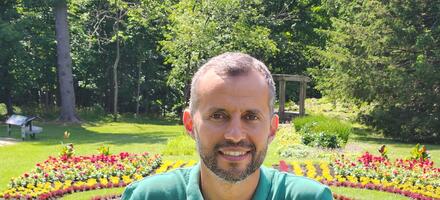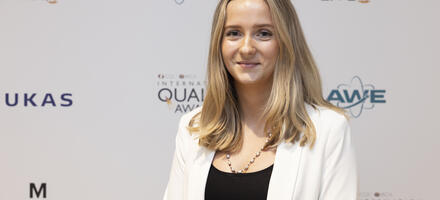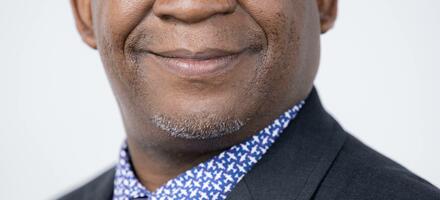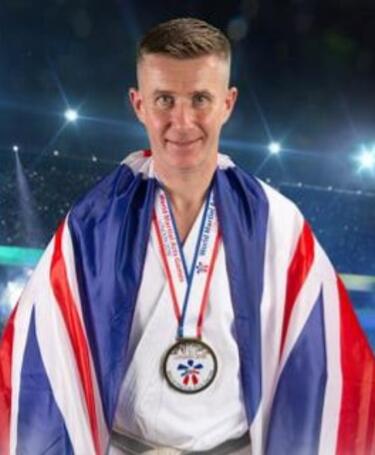
The (martial) art of quality
Progress indicator
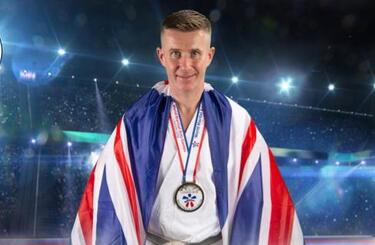
Dave Treadwell CQP MCQI is a black belt in two different but interrelated disciplines – Six Sigma and karate. He shares his quality journey
'Black belt’'is a familiar term both inside and outside the world of quality, but one person who understands better than most what the achievement represents is Dave Treadwell CQP MCQI.
As quality manager at the automotive organisation Valeo, covering operations in the UK, Holland and Germany, Treadwell earned his Six Sigma Black Belt. However, that qualification came more than 30 years after his first experience of becoming a black belt, in the discipline of Shotokan karate.
"I started at a local karate club on the outskirts of Birmingham, really because my dad wanted to push me into a little bit of self-defence," Treadwell explains. "I continued to train up until the age of 12 and then an instructor from Japan called Sensei Enoeda came over and he graded me for my black belt first degree at the age of 12.
"At the time – in the 1980s and 90s – the Japanese-style discipline that was taught in the UK was very regimented, and so it was very hard to get to black belt level."
From there, Treadwell’s hobby continued to develop into a passion. He opened his own club in his early 20s, before being picked to represent England at championship level when he was 27. Since embarking on competitions at a national level at 12, he has achieved 164 podium finishes, including at the World Martial Arts Games and World Championships.
Having been schooled in martial arts from a young age, Treadwell was well aware of Japanese philosophies long before he embarked on his career in quality.
"The philosophies and traditions around the Japanese culture fit really well with what I do as my day job," he says. "For example, the principles in karate are the three Ks – kihon (the fundamentals, kata (applications) and kumite (the sparring side). I always say to my students, if you have good kihon, then your kata will be good, which in turn should support you in your good kumite. It is the same in work – if your basics are right, then your application will be good and then you will be able to execute well on a day-to-day basis.
"Another good parallel is Kaizen. At work, we try to eliminate waste; in karate, we say 'don’t waste energy on the mat when you don’t need to'."
"I already had that mindset of continuous improvement, and it is also about using time correctly. We all have 24 hours in a day, and I am always pushing to learn more."
The mammoth amount of hard work and dedication that Treadwell has put into his karate journey cannot be underestimated.
"It takes roughly between three and five years to get your first-degree black belt in karate. You have to wait at least two years to take your second degree. When you’ve got your second degree, three years for your third degree, four years for your fourth, and so on," he says.
"From your first to your fourth degree, there is an examination on principles, and for my fifth degree, I did a thesis on the fundamentals of karate and what it means to me. After that has been validated, you take your fifth-degree black belt. For your sixth degree onwards – which is classed as master level – the focus is on what you are giving back to karate as well, such as coaching and mentoring.
"In June 2022, I took my sixth-degree black belt, and two months later an organisation from Japan got in touch with me and awarded me the status of shihan. A normal instructor is a sensai, and then a shihan is when an external body has validated you as a master in karate. Currently, I am GB coach World Champion and sixth-degree shihan in karate.
"Now I have to wait five and a half years for a seventh-degree black belt! Normally, seventh and eighth degree are in their 60s or 70s, because it takes time for that validation."
Having achieved such a high level in karate, Treadwell somehow also finds the time to carry out continuous learning in his day job as well.
"I don’t think I will ever stop being involved in karate and I am always learning from the people I coach," he says. "It is continuous improvement, which again goes back to that quality mindset in business."
Treadwell started his working life at main car dealers, including Peugeot, Jaguar and Ferrari, before joining Valeo around 20 years ago, working on the technical hotline. Having become a technical supervisor, the opportunity to move into quality came when the previous quality manager left the organisation.
"I didn’t really know a lot about quality back then, and didn’t really understand what it is about but, as a company, we always used Japanese methodology so with my background in martial arts I understood the principles around tools like Kaizen, Muda, and so on.
"At Valeo, we use a problem-solving tool called quick response quality control (QRQC), which sits in line with Plan, Do, Check, Act (PDCA) methodology. So, when I moved into my quality role, I quickly started learning this methodology.
"There are four levels – directed, skill, autonomous and role model – and it was a little bit like the black belt validation in karate, in that you have to go through certain levels to become a role model. At role model level, then you can train other people within the business. I was validated over an 18-month period so I could then start embedding this quality culture on a day-to-day basis across the whole business."
Treadwell went on to join the CQI, take his Level 5 diploma in quality (as well as a Level 5 diploma in health and safety) and then decided to learn more about Six Sigma.
"I started looking at Six Sigma because I really wanted to understand the design, measure, analysis, improve, control (DMAIC) side," he says. "I did a Six Sigma green belt (I remembered having one of those in karate when I was about eight!), and I then went on to gain my Six Sigma black belt and got the award for best project for my work on warranty analysis.
"I try to work on DMAIC in all walks of life, professionally and with karate. I always say you are only as good as your team, so I make sure that my team are working efficiently, but also enjoying the job at the same time."
Treadwell is always happy to share the story of his journey in both quality and karate, with the two interlinking so well.
"My journey in martial arts hasn’t always been easy," he says. "I won my first title at the age of 12 and then I didn’t win another until I was 24, but then from the age of 24 to 44, I had another 163 podium finishes. And, by not jumping straight into quality at the beginning of my career, I have had to learn on the job and work in the evenings as well to support my learning; it wasn’t easy at all, but it has been great.
"I already had that mindset of continuous improvement, and it is also about using time correctly. We all have 24 hours in a day, and I am always pushing to learn more. Every time I have a new tool in my toolbox, I have to make sure that tool is sharp; I am always willing to learn from others and to strive for something else."
Not everything can be measured
Can measuring something actually devalue it? Ryan Renard CQP MCQI makes the case.
Quality World

Get the latest news, interviews and features on quality in our industry leading magazine.
